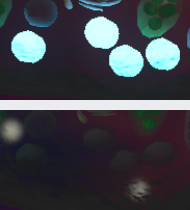Bioluminescent Vacuole
Creates Light ![]() and increases Oxygen Tolerance of a cell that has it.
and increases Oxygen Tolerance of a cell that has it.
Requirements
A cell must have a Nucleus to evolve Bioluminescent Vacuole.
Processes
Luciferase Synthesis: ATP ![]() + Oxygen
+ Oxygen ![]() → Light
→ Light ![]()
Modifications
No modifications.
Effects
Cells with Bioluminescent Vacuoles have their Oxygen Tolerance increased.
Upgrades
No upgrades.
Strategy
With limited gameplay effects, the Bioluminescent Vacuole mostly just looks nice. However, it does provide extra oxygen resistance which can be necessary in cases where more oxygen resistance is required than the resistance slider can provide, for example, if there is much negative tolerance from other organelles.
Scientific Background
Many real organisms are bioluminescent, including some bacteria and protists. The act of chemically producing light within an organism's body has many uses, including attracting mates, communicating with members of the same species, and attracting or repelling other species. Bioluminescence in microscopic algae can produce algal blooms, illuminating enormous regions of ocean in a blue-green glow.
At present, we haven't agreed an in-game function for bioluminescence. Although it would be a nice cosmetic touch and even a player aid in dark environments, useful game mechanics based on bioluminescence have been hard to formulate specifically. Intra-species communication is already covered by the Signaling Agent, and any other uses seem difficult to justify when it would incur an inevitable ATP ![]() cost.
cost.
It may take the form of a Bioluminescent Vacuole or a more specific organelle. One real-world example is the scintillon.
If you feel strongly about the inclusion of Bioluminescent Vacuoles or have suggestions for worthwhile in-game functions, head to our suggestions board.

